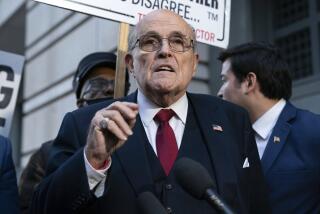Arizona to Sue Tobacco Firms, Says GOP Official
- Share via
Widening the legal assault on the tobacco industry, the Arizona attorney general announced Wednesday that his state would file a massive lawsuit against the industry’s leading companies, becoming the first elected Republican attorney general to do so.
Grant Woods said the suit, to be filed later this summer in state court, will seek damages of at least $300 million for money spent since 1988 to care for indigent Arizona residents whose health was damaged by smoking.
Additionally, the state will seek to prohibit tobacco companies from targeting children in the advertising, promotion and sales of their products. The suit would parallel those filed by nine other states during the past two years.
“Big tobacco has engaged in unlawful conduct, including violation of state and federal antitrust and consumer laws,” Woods said. “As a direct result, their products have killed more Arizonans than AIDS, homicide, suicide, car accidents, alcohol and drug use combined. Each year, more than 5,000 Arizonans die from tobacco use,” he said in a prepared statement.
First elected in 1990 and reelected in 1994, Woods said he thought the act of an elected Republican attorney general suing might encourage others of his party to file their own cases.
“This should not be a partisan issue,” Woods added. He stressed that the speaker of the Arizona House of Representatives, Mark Killian, “a conservative Republican,” had been urging him to file the suit for months. In April, Christine Todd Whitman, New Jersey’s Republican governor, announced her intention to sue the industry. The suit has been delayed because the state’s attorney general, an appointed position, has been nominated for the New Jersey Supreme Court.
In response to Woods’ announcement, the nation’s two largest tobacco firms decried the prospect of another suit. “The state has no legal basis upon which to sue the cigarette manufacturers,” industry leader Philip Morris U.S.A. said in a statement. “We believe the state, if it does decide to file suit, will lose--after spending millions of taxpayer dollars in time and costs.”
Peggy Carter, a spokeswoman for R.J. Reynolds, the nation’s second largest tobacco company, said: “We firmly believe there is no basis in law or fact for these lawsuits.” She contended that the state will not be able to demonstrate that it has experienced an economic loss stemming from tobacco sales.
In a related development Wednesday, Sen. Frank Lautenberg (D-N.J.) introduced legislation that would make it more attractive for states to sue the tobacco industry. Now, each state would have to return the federal Medicaid share of any damage awards they win.
Lautenberg’s bill would give states 33% of the federal share, on top of the state share they recover. Another 33% of the federal share would go into a National Institutes of Health trust fund to combat smoking-related illnesses and the rest would go toward deficit reduction.
On another front, private New York attorneys filed separate class actions against the five major cigarette manufacturers on behalf of all New York residents “who have become nicotine dependent.”
The suits are the fifth set of litigation to be filed since a national class action suit was thrown out by federal judges in New Orleans last month on the grounds that the case was too big to be manageable. Since then, state class actions have been filed in New Mexico, Louisiana, Maryland and the District of Columbia. A similar lawsuit is expected to be filed in California by month’s end.
Each New York suit names as defendants a single manufacturer along with the Tobacco Institute and the Council for Tobacco Research. In addition to Philip Morris and Reynolds, the plaintiffs sued Brown & Williamson, American Tobacco Co. and Lorillard Inc.
Lead counsel Martis Ann Brachtl, of the New York firm Goodkind, Labaton, Rudoff & Sucharow, said the plaintiffs filed separate lawsuits to keep things simple, in deference to the concerns of a federal appeals court about the complexity and unwieldiness of the national class action, known as the Castano suit.
“They are very simple, very straightforward lawsuits,” Brachtl said. “They allege that the tobacco companies told the citizens of the state of New York that tobacco is not addictive, which is not true. We allege that they knew that tobacco was addictive but concealed it from the public in order to sell more cigarettes. . . . We allege that they controlled the nicotine content of the cigarettes with the effect of creating and sustaining the addiction.”
The suits allege that the companies violated New York’s consumer protection law barring deceptive practices as well as engaging in common law fraud.
But Reynolds spokeswoman Carter predicted that these suits would fail too: “We firmly believe the Castano ruling is a clear indication that these suits should not be brought in this manner at the federal or state level. The problems that exist with the Castano ruling at the federal level exist on the state level.”
More to Read
Sign up for Essential California
The most important California stories and recommendations in your inbox every morning.
You may occasionally receive promotional content from the Los Angeles Times.













